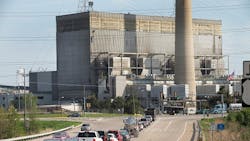White House Announces New Corporate Efforts to Fight Climate Change
Apple, Alcoa, General Motors and other U.S. business giants pledged at least $140 billion in new efforts to reduce emissions and fight climate change, the White House announced today. The corporate actions come as part of the Obama administration’s American Business Act on Climate Pledge, designed to build support for the December climate summit in Paris.
Other companies participating in the pledge are Bank of America, Berkshire Hathaway Energy, Cargill, Coca-Cola, Goldman Sachs, Google, Microsoft, PepsiCo, UPS, and Walmart. The companies had 2014 revenue of more than $1.3 trillion and a combined market capitalization of at least $2.5 trillion.
President Obama has been ramping up the fight against climate change during his second term. His administration has been rallying support for the Paris talks, which are intended to secure a commitment to limit the rise in global temperatures linked to greenhouse gases to 2 degrees Celsius over pre-Industrial Revolution levels.
Government scientists announced that 2014 was the warmest year across the world's land and ocean surfaces since recordkeeping began in 1880. And June marked the fourth month of 2015 where a monthly global temperature record was broken.
Last September, Obama told the U.N. Climate Summit, “There’s one issue that will define the contours of this century more dramatically than any other, and that is the urgent and growing threat of a changing climate.”
The 13 companies taking the pledge today announced a variety of new actions. They include:
Alcoa: Reduce absolute GHG emissions by 50% in the U.S. (vs. 2005 baseline) by 2025, and by 2025, demonstrate a net reduction of GHG emissions from the use of its products equal to three times the emissions created by their production.
Apple: The company is already running all of its U.S. operations on renewable energy, but will bring an estimated 280 megawatts of clean power generation online by the end of 2016 through investments in Arizona, California, Nevada, North Carolina, Oregon and Sichuan Province, China.
Cargill: Having already improved its energy efficiency by 16% since 2000, the agriculture and industrial conglomerate said it would build on its 2015 baseline to Improve greenhouse gas (GHG) intensity by 5%, improve freshwater efficiency by 5%, improve energy efficiency by 5% and increase renewable energy to 18% of its total energy use, up from 14%.
General Motors: America’s largest automaker said it would reduce energy intensity from facilities 20% by 2020 over a 2010 baseline, as well as reduce carbon intensity by 20% and water intensity by 15%. The company also pledged to reduce total waste 40% by 2020 and achieve 150 landfill-free facilities. GM also said it would work to make electric vehicles become more mainstream.
Google: Google has purchased 1.1 gigawatts of renewable energy to power its data centers, and committed to tripling purchases of renewable energy by 2025. The company also said it would continue its $2 billion/2.5 gigawatts investment in global clean energy projects, including major investments by 2025 in emerging markets. Google also committed to reducing single occupancy vehicle commuting by its employees in its Bay Area headquarters to 36% of commuters, a 10% reduction compared to current levels.
The White House said the commitments by the companies would result in more than 1,600 megawatts of new renewable energy, as well as reductions in energy use and pollution and aid in efforts to fight deforestation. The administration announced it will release a second round of climate pledges by “many more companies” in the fall. In addition, the White House said on October 20-21, Secretary of State John Kerry will lead a forum at the State Department to highlight “American leadership in climate investment and innovative solutions to our toughest climate finance challenges.”
About the Author
Steve Minter
Steve Minter, Executive Editor
Focus: Leadership, Global Economy, Energy
Call: 216-931-9281
Follow on Twitter: @SgMinterIW
An award-winning editor, Executive Editor Steve Minter covers leadership, global economic and trade issues and energy, tackling subject matter ranging from CEO profiles and leadership theories to economic trends and energy policy. As well, he supervises content development for editorial products including the magazine, IndustryWeek.com, research and information products, and conferences.
Before joining the IW staff, Steve was publisher and editorial director of Penton Media’s EHS Today, where he was instrumental in the development of the Champions of Safety and America’s Safest Companies recognition programs.
Steve received his B.A. in English from Oberlin College. He is married and has two adult children.
